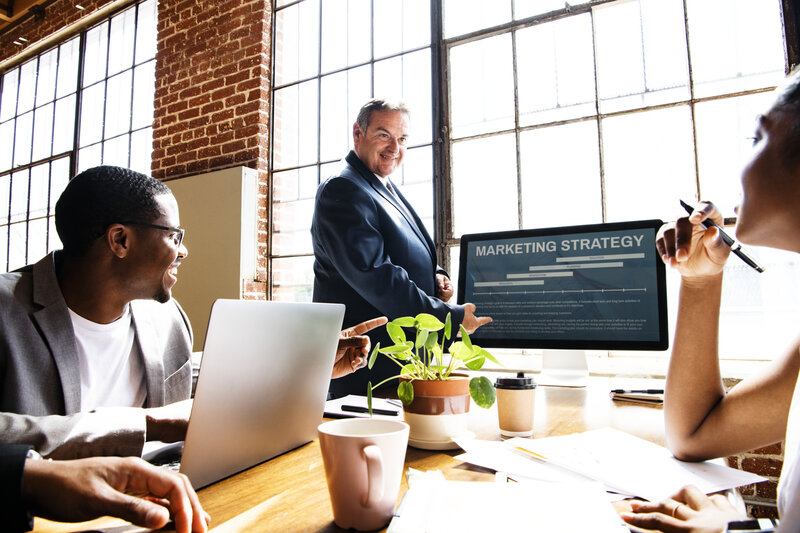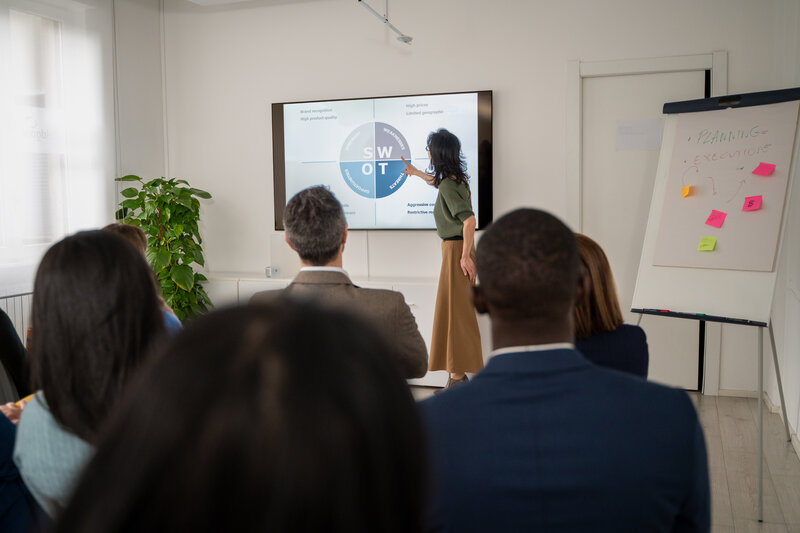
The B2B event marketing landscape has come a long way since the pandemic forced a rapid pivot to virtual events in 2020. What began as a necessary adoption turned into a more intentional hybrid-savvy strategy. However, today’s B2B audience prefers flexibility, with some still preferring face-to-face connections, while others seek the convenience of virtual spaces. As successful event professionals like you, it’s your job to bridge the two worlds seamlessly.
More importantly, events have transcended their basic utilitarian purpose as lead generation tools, and are now central to demand generation, brand positioning, and long-term relationship building. Whether through large-scale summits, intimate roundtable discussions, or always-on webinar series, B2B events serve as strategic touchpoints across the entire customer journey, from awareness to conversion and loyalty.
As such, in this guide, we will explore the key B2B event marketing trends in 2025, from the rising importance of personalized content and a focus on long-term customer retention, to blending online and offline experiences using the latest technology and tools. Discover what event organizers need to succeed in a rapidly changing landscape.
The Current State of B2B Event Marketing In 2025
The B2B event marketing has entered a new era, defined less by event attendance and more by meaningful audience engagement, personalization, and long-term value. In 2025, events are expected to meet audience expectations by delivering genuine, tailored experiences that resonate with them at every stage of their buying journey.
Today’s B2B event audience is more discerning. They want to discuss their experiences and challenges directly with the relevant stakeholders, explore opportunities for networking with like-minded professionals to gain real-life solutions and insights, and receive adequate follow-ups to ensure their time is spent effectively. According to a B2B event marketing platform, SellersCommerce, around 67% of buyers emphasized the importance of personalized information, customization, and localization in their B2B buying experience, highlighting the need for event organizers to adopt a more personalized approach in the B2B event content.
This shift in expectations is reflected in how event marketers and companies evaluate success. As per a report from Forrester, 70% of organizations have reported event-led marketing sourced pipeline as their most common performance metric, a clear shift away from conventional metrics like event registration numbers. Events are increasingly integrated into broader demand generation, content, and sales strategies, and not as one-off efforts.
To summarize, the B2B event marketing trend in 2025 is about creating ongoing value, where the strategy has shifted from collecting names to cultivating trust, which is shaping how event marketers plan, promote, and measure B2B events in 2025.

Key B2B Event Marketing Trends to Watch in 2025
Let’s explore in detail the key B2B event marketing trends in 2025 that have the most impact on changing the overall B2B event marketing landscape:
1. More Focus on Relationship-Building, Not Just Leads
In 2025, B2B event marketing is moving away from capturing leads for the sake of quantifiable volume. According to the Splash Event Marketing Statistics Report, 52% of attendees prefer going to networking events where they can discuss challenges with other industries. This encourages event marketers to design B2B events with not just the goal of capturing leads, but to create a networking experience that builds on brainstorming new ideas through cognitive challenging activities, leading to a deeper professional relationship. As such, event marketers are focusing on meaningful interactions that foster long-term business relationships.
This change is reflected in the growing popularity of more intimate event formats that focus on networking, like executive roundtables, invite-only workshops, and private dinners. These event formats allow for high-value conversations with relevant people, tailored content, and a focus on creating and maintaining genuine relationships. When the prospect of talking to someone only for the sake of conversion is eliminated, the interaction takes a more natural turn that leads to trust and mutual respect, the cornerstone of a healthy professional relationship. Overall, this approach has more impact on pipeline and customer loyalty than generic lead capture strategies.
Therefore, event marketers can integrate B2B events into broader account-based and customer strategies, focusing on quality over quantity.

2. Personalization Is Becoming The Norm
In 2025, personalization isn’t just a nicety; it’s expected. As event marketers, you must leverage event data to tailor every touchpoint of the customer journey, from the very first event invite to the follow-ups.
Many event platforms now allow event marketers to use crucial event data like attendee behavior, demographics, content preferences, past behavior, and engagement history to create customized communications. Emails, agendas, calendars, and even networking suggestions are increasingly adapted to meet individual preferences, making attendees feel understood and valued.
This data-driven personalization extends after the event through customized follow-up campaigns that focus on what each attendee has interacted with, rather than sending generic and irrelevant follow-ups that are seen as spam. This approach yields higher engagement, a stronger brand presence, and a greater likelihood of moving prospects through the sales funnel.
Now that you’ve understood how data-driven personalization works and will impact B2B events in 2025, read this article to know how AI-driven personalization can do wonders for your event, “How AI-Powered Personalization in Events is Driving More Attendee Conversions”.
3. Events as Year-Round Engagement Tools
One of the biggest B2B event marketing trends in 2025 is the shift from having one-off events to creating a continuous engagement throughout the year. Instead of treating events as isolated campaigns, event marketers are building ongoing programs that keep their audiences engaged long after the event.
This shift is fueling the rise of new and innovative event formats like monthly webinar series, quarterly executive briefings, and consistent business communications on Slack or LinkedIn. These recurring events keep brands at the top of mind of their customers, build relationships over time, and create more value-driven opportunities.
By turning B2B events into an always-on engagement strategy, event marketers can help brands nurture leads more effectively by gathering ongoing insights and positioning the brand as a consistent presence.

4. Content Repurposing & Distribution at Scale
B2B events are recognized as powerful content engines in 2025. B2B event marketers have realized the power of content marketing and are using that knowledge to adopt a full content operations model for pre-event, during the event, and post-event, to maximize ROI.
This results in event sessions being turned into bite-sized content and multiformat assets, like Instagram reels, YouTube shorts, LinkedIn videos, audiograms, blog takeaways, quote graphics, and AI-edited highlight videos. These snackable pieces extend the event’s reach and keep the conversation going, as this short-form content has a higher chance of being consumed and shared by the masses.
In terms of content distribution at scale, SellersCommerce reported that 80% of B2B event marketers prefer LinkedIn to promote their content. Similarly, another statistic showed that large companies outsource 75%, while medium and small companies outsource 54% and 37%, respectively, of their content creation activities. Therefore, through the strategic use of distribution powers, event marketers are pushing this content through segmented email drips, social media, event landing pages, and other owned channels, ensuring the value of the event continues to live on and engage prospects across the funnel.
5. Owned Events Over Sponsored Booths
In 2025, B2B companies are shifting their focus from sponsoring third-party events to hosting their own. The growing allure of this change is the opportunity for greater control over the experience, audience, and outcomes, through formats like branded summits, executive forums, or annual user conferences.
By investing in their event IPs, businesses can create a consistent narrative tone across their marketing channels as a means to strengthen their relationship with the customer base. They can tailor content to specific segments and collect first-party data without limitations. Overall, these branded events help strengthen brand authority and deepen customer relationships in ways that passive booth sponsorships cannot match.

6. Social Proof As Authentic Event Reviews
In a trust-driven B2B event marketing, authentic peer validation matters more than polished sponsored ads. As such, in 2025, event marketers are leaning heavily into real event reviews as social proof to build credibility, drive registrations, and differentiate their event brand in this competitive environment.
Just as we review products before making a purchase decision, event professionals today check event reviews to decide whether an event is worth their time. Platforms like Eventible have become crucial to this process, offering verified reviews from real attendees across industries and professional roles. These reviews give insights into the session quality, networking opportunities, or speaker credibility, all of which are in high demand today.
Event marketers can strategically use this social proof across the funnel by:
- Highlighting 4+ star Eventible reviews in pre-event emails and landing pages to build trust.
- Sharing review snippets and testimonials on LinkedIn to boost credibility and brand visibility.
- Analyzing feedback to improve future events and showcase commitment to the audience experience.
Additionally, encouraging attendees to leave reviews post-event creates a feedback loop that strengthens brand equity and supports year-round promotion. Read more about how social proof impacts event registrations by going through this blog: “How Will Social Proof Impact Event Registrations in 2025”.
7. Smarter Use of Event Data
In 2025, event marketers are using advanced technology and analytics tools to capture and understand granular data on attendee behavior, like which sessions were attended, how long people stayed, what questions they asked, what polls they responded to, and which booths they visited.
This behavioral data enables marketers to segment audiences based on interest and intent, allowing them to personalize timely follow-ups. For instance, attendees who engaged deeply with a product session can be followed up with targeted content, such as case studies and product demo invites, rather than sending a generic thank-you email.
Additionally, this data can help sales and marketing teams to align their outreach efforts with actual attendee interests. This insight can drive conversions, accelerate the pipeline, and improve the overall event ROI. Learn more about how Eventible can turn event data into actionable strategies by reading this article on “How Can Eventible Help in Turning Event Data into Your Next 100 Sales-Qualified Leads?”.

8. The Rise Of Sustainable Events
One of the most noticeable B2B event marketing trends in 2025 is the growing adoption of sustainable events, to the point where it’s not a nice-to-have, but a strategic imperative in B2B event marketing. This change is highlighted in the fact that, as per the AMEX Global Meetings and Events Forecast, over 50% of marketers say that sustainability is crucial for their organization. With growing pressure from environmentally conscious stakeholders, government regulations, and internal ESG goals, brands are rethinking how events are planned, executed, and measured.
Event marketers, like you, can embrace eco-friendly practices such as:
- Creating an option for hybrid or digital-first formats to reduce travel emissions.
- Waste reduction strategies include eliminating single-use plastics and adopting a paperless approach.
- Sustainable venue choice, preferably powered by solar panel roofs, with green certifications.
- Carbon offset programs are integrated into event planning.
Essentially, event marketers need to put sustainability at the center of event planning, not only to satisfy eco-conscious attendees and stakeholders, but for its sake. It has a competitive advantage. Events that demonstrate environmental responsibility tend to resonate with B2B buyers and young decision-makers who prioritize purpose-driven goals.
9. Mixing Online and Offline Experiences
Virtual and hybrid events were all the hype in 2020. But in 2025, they’re not dead, just evolved. Brands are constantly experimenting with new technology to blend in-person and digital elements to create a comfortable experience for the attendees, while maximizing reach and engagement.
Since 2020, physical events are back in full swing, backed by the fact that Freeman’s Trend Report showed 80% of respondents trust in-person events as the best marketing channel. However, brands are complementing them with on-demand session recordings, virtual Q&As, and digital networking lounges. This approach ensures inclusivity for remote attendees and extends the event’s life cycle beyond the venue limitations.

10. Better Measurement: From Leads to Impact
B2B event success in 2025 isn’t measured by registrations alone. Event marketers are focusing on pipeline contribution, deal velocity, brand awareness, and customer retention to evaluate true ROI.
Today, event success measurement has shifted from counting leads to creating an ecosystem where the marketing and sales teams align to use CRMs, event platforms, and attribution to evaluate how event engagement leads to real business outcomes. For example, an attendee’s behavior, such as session participation or booth visits, can be counted as closed deals with long-term customer value. By measuring impact over impressions, events are evolving into a critical driver of revenue and relationship growth in the B2B world.
Emerging Technologies Shaping Event Marketing
In 2025, technology continues to play an important role in B2B event marketing, enabling greater personalization, smarter planning, and better performance tracking. Here are some of the important emergent technologies that are shaping the B2B event marketing scene:
- AI Copilots for Marketing Workflows: Generative AI tools are everywhere now. According to the SellersCommerce report, 46% of B2B companies utilize AI for chatbots and virtual assistants. Event marketers can use AI assistants to draft email sequences, create personalized landing pages, auto-generate social media content, and even summarize session recordings. This enables marketers to focus on strategic thinking tasks while ensuring smooth and efficient operations.
- Predictive Analytics for ROI Forecasting: According to SellersCommerce, 67% of B2B companies implement AI for product recommendations, and 42% use it to optimize their pricing and customer segmentation. In short, predictive tools help marketers estimate expected registrations, conversion rates, and revenue impacts before the event commences. After the event, these insights are used to compare outcomes and optimize future event strategies.
- Immersive Tech (AR/VR) as Enhancers, Not Essentials: While full-scale adoption of virtual reality events is still a niche, lightweight applications of AR/VR technologies are gaining traction. The impact of this adoption can be seen in 3D product demos or interactive booths, and hybrid expos. These tools may not be the core aspects, but they can enhance the attendee experience of your event. Explore how these new technologies can deliver an interactive attendee experience by reading this blog: “How Experiential Events Drive Higher-Intent Registrations”.
Together, these technologies are making B2B events smarter, faster, and more data-driven, helping event marketers achieve better results with less effort.

Future Outlook: What’s Next Beyond 2025?
Looking ahead, B2B events are expected to blur the lines between product marketing, customer marketing, and brand storytelling. Events will no longer exist in silo, rather it will be an integrated part of a broader lifecycle strategy, from onboarding to adoption to advocacy.
We might also see the emergence of decentralized event communities based on Web3 principles. These peer-led networks could allow attendees to co-create value, actively contribute and participate in event content creation, vote on topics, and shape the event experience, shifting the power from event organizers to event communities.
Finally, as AI and automation grow, emotional intelligence will be a distinguishing factor. The most valued and effective event marketer will be the one who can understand audience sentiment, foster genuine connections, and design event experiences that feel human, because in an increasingly digital world, empathy will be a competitive edge.
Key Takeaway
As B2B event marketing continues to evolve in 2025, success lies in staying agile, looking for opportunities, and leveraging the right technologies to get the best outcome. For event marketers like you, it’s simply not enough to just host events; instead, you must think like experience-led brand strategists, designing every aspect of the event to build trust, engagement, and long-term value. To learn more about B2B event marketing trends in 2025, read this article: “The State of Event Marketing: Event Trends to Lookout for in 2025”.
To stay ahead of the competition, visit Eventible to learn more about B2B events and how you can create a successful event.




Comments are closed.